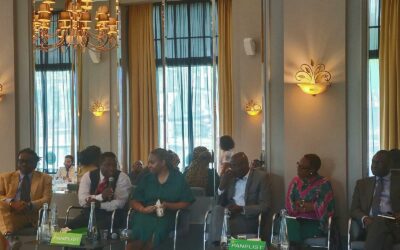International Dialogue on Migration organised by IOM. Geneva, 15 – 16.10.2020
Ms. Carine Nsoudou, Executive Director of ADEPT and Mr. Céleste Ugochukwu, Executive Director of AFMD (African Foundation for Migration and Development), member of ADEPT, attended the 20th edition of the IOM International Dialogue on Migration (IDM), on October 15 and 16 in Geneva.
The IDM is IOM’s principal forum for migration policy dialogue. Founded in 2001 and rooted in IOM’s Constitution and Strategy, the IDM is open to IOM Member and Observer States, as well as international and non-governmental organizations, migrants, and partners from media, academia or the private sector. The IDM provides a space to analyse current and emerging issues in migration governance and to exchange experiences, policy approaches and effective practices.
This year 20th Edition theme was: “Reimagining the role of migrants and human mobility for the achievement of the Sustainable Development Goals.”
During the panels, Ms. Nsoudou and Mr. Ugochukwu made the following statements :
“On the enhancement of migrants’ agency and contribution to the achievement of the Sustainable Development Goals, ADEPT observes with great interest the efforts of the international community and UN member states to continue to engage and support the efforts and contributions of migrants and diaspora both in the host and countries of origin.
ADEPT has equally taken note from presentations and comments made in the sessions that migrants and diaspora are no longer seen as object of discussions in the international migration dialogue and mere cash cows that only remit money for household affairs to their countries of origin.
We are delighted to note the recognition of the diaspora contributions elsewhere in the social, technical, and SMEs development both in host and countries of origin, thereby underscoring the role of the diaspora as agent and major stakeholder in the development process.
Going forward, we would like to recommend the following:
- ADEPT do hereby invite the diaspora community to remain steadfast in building their capacity, forge more united front to maximise their impact and make their voice heard in the migration and development discourse.
- Countries of origin are tasked to develop and strengthen friendly policies and measures capable to support, boost confidence and guarantee the safety of diaspora investment and entrepreneurship as well as technical and know-how transfer, (brain-gain) condition necessary to develop further and strengthen local SMEs through diaspora remittances.
- The host countries are encouraged to continue to engage, stimulate and maximise their support towards the empowerment of migrants and diaspora, building their capacity to boost their technical and socio-economic contributions in both host and countries of origin despite challenges that might surface in the process.
Indeed no-one is safe until everyone is safe!”
And on the role of women in the COVID-19 response and recovery :
“ADEPT rejoices the fact that migrant women are once again put under the spotlight. Women have played (or we should say, are playing as the pandemic is not over) a major role in COVID-19 response and recovery. They often do so in the framework of their regular job as many of them are COVID-19 front-liners but not only.
It is crucial to stress the fact that a large number of them went out of their way to assist those more or as vulnerable as them, be it in their countries of residence or in their countries of origin.
From food distribution in Belgium to mask production in Nigeria, from fundraising to finance personal protective equipment for Madagascar’s medical staff to the creation of a helpdesk intended for migrants of Eritrean origin in the Netherlands, the actions conducted by migrant women – and migrant in general – to mitigate the impact of COVID-19 have been manifold and deserve to be highlighted. This is what we in ADEPT we have decided to do through a media campaign aiming at showcasing stories of migrants, a majority of which are women, that used their agency to help those in need.
These stories prove that even in time of extraordinary uncertainty, migrants remain agents of change.”





